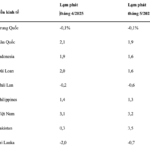On June 18, during a discussion on socio-economic issues, National Assembly Deputy Thai Thu Xuong (from Hau Giang) – Vice President of the Vietnam General Confederation of Labour (VGCL), pointed out that voters, especially workers in industrial zones, are facing a “double squeeze.”
Specifically, on the one hand, electricity and gold prices have been on the rise, leading to subsequent increases in food and commodity prices. On the other hand, there is the issue of unstable employment, declining income, and precarious livelihoods.

National Assembly Deputy Thai Thu Xuong. Photo: QH
The deputy provided evidence that since 2023, the Vietnam Electricity (EVN) has increased electricity prices four times, totaling a 17% increase. In contrast, the minimum wage for workers has only been raised once, with a 6% increase.
“This has left many workers unable to afford their daily necessities, let alone save or invest for the future,” she worriedly stated.
According to her, workers and direct producers of material wealth for society have not received adequate attention. They live in cramped rented rooms with basic facilities and struggle with their finances.
Therefore, she earnestly requested that the Government take measures to control inflation and stabilize essential commodities, particularly electricity, food, and commodities. She also suggested that the Government consider adjusting electricity prices to favor low-income earners.
Urgent consideration for adjusting and increasing regional minimum wages
Additionally, the female deputy proposed an urgent consideration for adjusting and increasing regional minimum wages starting in July. She argued that this is a pressing need arising from the reality of workers’ lives. The regional minimum wage should truly meet the minimum standard of living, as stipulated in the Labor Code.
In the previous meeting, several deputies also requested an early salary reform to increase the income of civil servants after the merger of provinces and communes.
According to Deputy Nguyen Hoang Bao Tran (from Binh Duong), increasing the salaries of provincial and communal civil servants would create incentives and help retain talent, given the increased workload post-merger and the need for longer commutes.
The deputy from Binh Duong suggested that, in addition to support for those who retire early, the Government should soon reform salary policies for officials and civil servants who continue to work in the new apparatus.
Inflation Cooled, Asia Opens Doors to Lower Interest Rates
Inflation is taking a downward turn across Asia, thanks to falling food and fuel prices and the appreciation of several regional currencies against the US dollar, which helps to lower import costs.













































